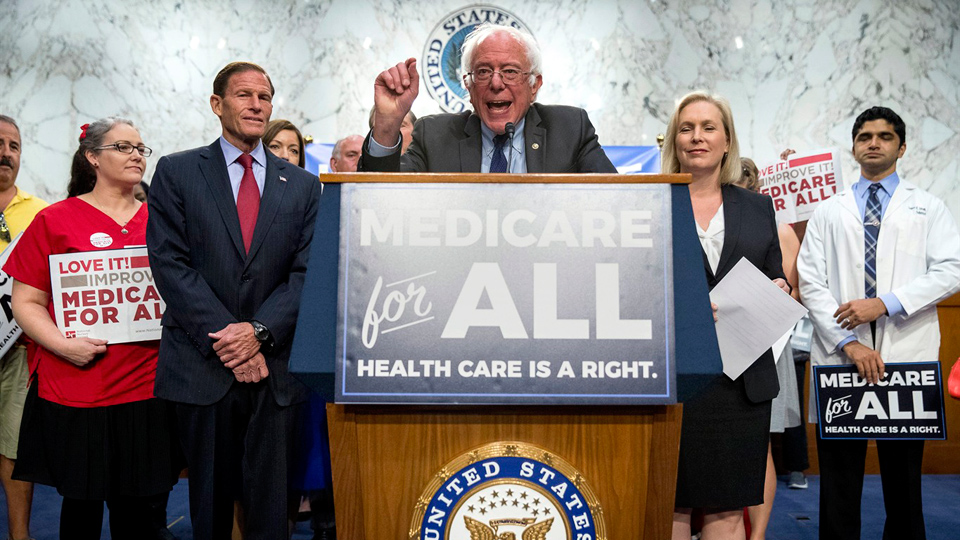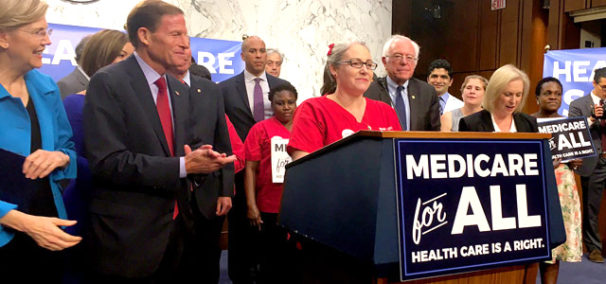
WASHINGTON — In an event that was billed as a press conference but morphed into a campaign rally, Sen. Bernie Sanders, Ind-Vt., formally introduced his Medicare for All legislation on Sept. 12.
But in an indication of the changed political optics of the measure, which would establish single-payer government-run national health insurance for all Americans, Sanders and his supporters from National Nurses United (NNU)—whose members provided a big share of the standing-room only crowd in a large Senate hearing room—aren’t lone wolves on the issue anymore.
Sanders announced 16 senators are co-sponsors of the legislation. Four named as potential nominees on the 2020 national Democratic ticket—California’s Kamala Harris, Massachusetts’ progressive firebrand Elizabeth Warren, New York’s Kirsten Gillibrand, and New Jersey’s Cory Booker—joined Sanders on the podium to enthusiastically endorse the measure.
Behind them and in the crowd were dozens of NNU members, including one who flew in from California to speak. Speakers were often interrupted by “Medicare for All!” chants and faced waving signs, with the same slogan, from the packed room.
“The media likes to talk about the politics of this. But that’s not what concerns the American people: They want to know what we’re doing to fix a dysfunctional system,” Sanders declared.
“It’s a health care system that costs twice as much” as those in other developed nations “and still leaves 28 million people uninsured.” Single-payer, he repeatedly emphasized, would insure them all.
Sanders and veteran Rep. John Conyers, D-Mich., have introduced Medicare for All for years, but it’s gone nowhere in the Republican-run Congress. And even when Democrats ran the show in 2009-10 and held hearings and worked on the Affordable Care Act (ACA), they ignored single-payer. Its lesser cousin, the so-called “public option” got short shrift then on Capitol Hill.
Thanks to Sanders’ insurgent presidential campaign last year, and the enthusiasm it roused for him and his policies—single-payer among them—the politics of single-payer have changed.
The government would pay through a payroll tax increase, aimed at the rich, and by abolishing insurance company premiums.
Sanders released few details of Medicare for All, other than to say it would cover everyone in the U.S., including the 28 million people still left uninsured even after passage and implementation of the ACA. The Census Bureau reported the day before that, including Medicare and Medicaid, 8.8 percent of all U.S. adults lack medical coverage, an all-time low.
His measure would cover the remaining uninsured, Sanders promised. And that would also include undocumented people, Sen. Mazie Hirono, D-Hawaii, stated. The ACA excludes the undocumented.
He said the government would pay for health care coverage through a payroll tax increase, aimed mostly at the rich, and abolition of insurance company premiums that now cost workers and their families thousands of dollars per year.
Medicare for All has been a top NNU cause for years, and Sanders’ long championship of it led them to be the first union to endorse his Democratic presidential bid. Some 21 unions strongly pull for Medicare for All, including the Steelworkers and the Amalgamated Transit Union. The AFL-CIO recently endorsed it as a prime health care option, not just a future distant goal.

“We have been working across the country for many years to bring to life a more humane health care system,” said Melissa Johnson-Camacho, the NNU member and oncology registered nurse from Northern California who flew in to speak at Sanders’ event.
“We want one based on patient needs, not pain and profit. I am here to advocate for my patients,” she declared. A cancer diagnosis now, even with the ACA, means not just pain and suffering, but still, for many, financial ruin, said Johnson-Camacho, who treats cancer patients.
And Sanders added two other benefits of single-payer: Lower costs for business, as testified by a business owner, Richard Masters, CEO of MCS industries, and greater career choices for workers.
“We say to millions of workers that you should not have to be stuck in a job you don’t want just because it provides health care for your family. The economy and your family will benefit” through increased ability of workers to change jobs and not lose health coverage, Sanders stated.
“This is a non-partisan issue,” California’s Harris contended. “Cancer, heart disease, and diabetes affects everyone, whether you live in a red state or a blue state. Health care is a right despite your status, your gender, or your zip code.”
Though energy for single-payer was palpable in the room, and polls show rising acceptance of it nationwide, Sanders and other speakers warned of pitfalls in a long road towards success.
He said special interests, led by the pharmaceutical and insurance industries, would do their best to stop single-payer. The two industries hugely profit from the current system, even with the ACA as law for the past seven years, and several speakers said they profit from people’s suffering—including the suffering of those to whom they deny care. Single-payer, Sanders said, would put the insurers out of business and put negotiations over drug prices in the hands of the government.
The answer to that, speakers said, is enormous grass-roots organizing, like the massive organizing that saved the ACA from its death at the hands of Congress’ ruling Republicans in July.
“We have dozens of grass-roots organizations and unions that will help pass this bill,” Sanders stated. “But today we begin a long and difficult struggle to end the disgrace of the U.S. being the only major country not to guarantee health care for all.
“Our opponents have the money and the power,” Sanders said of the insurers and the drug companies. “But if millions of people in this country get involved and fight back, I have no doubt we’ll pass Medicare for All sooner than people believe.”












Comments